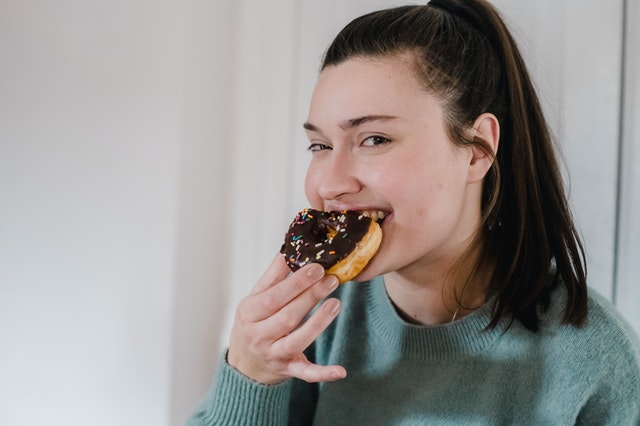Food cravings is an intense desire for a specific food. This desire can seem uncontrollable, and a person may feel as though they cannot satisfy their hunger until they get that particular food. Food craving is thought to mediate uncontrolled eating behavior, such as seen in obesity, binge eating disorder, and bulimia nervosa.
Do you eat “well” all day, but can’t put down the box of cookies at night? Or a handful of chips? Or a spoonful of peanut butter? I am going to share with some tips…
What is Cravings?
Craving, a construct that is primarily known from addiction research, refers to a subjective motivational (‘wanting’) state promoting substance-seeking and ingestive behaviors. Drug craving is generally believed to contribute to the transition from casual to compulsive drug use, persistence of addictive behaviors, and relapse in substance-dependent patients who are abstinent from drugs of abuse.
What is Food Cravings?
Food craving is generally defined as an intense desire to eat a specific food item. Different types of food cravings have been described, from craving for chocolate, being the most frequently craved food, to craving for all sorts of palatable, mostly sweet and/ or high-fat foods.
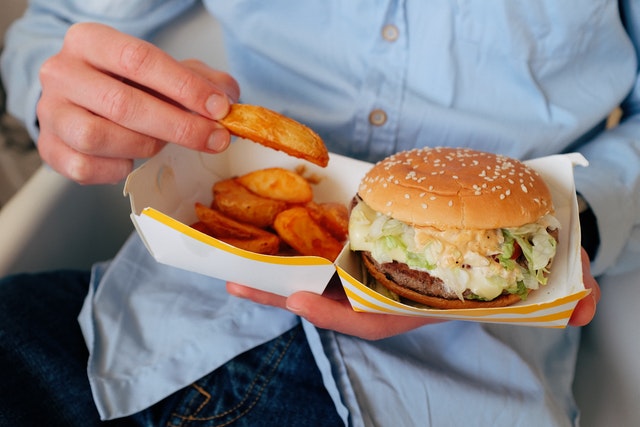
Cravings in Overweight?
In overweight dieters, this craving for food is thought to be involved in the inability to comply with a low-calorie diet, resulting in relapse to initial over-eating patterns. In addition, in non-clinical samples, food craving has been found to be related to body weight, suggesting a ubiquitous role of craving in food consumption.
Body or Mind?
“It’s important to distinguish whether the craving is physiological or psychological”. “Pay attention so that you can determine whether you are feeling actual hunger in your stomach.”
Physical cravings may be a result of low fat intake or low blood sugar level. For many of us, the mid-afternoon cravings we feel are merely our body’s way of telling us it has been too long since lunch and we actually need to eat. A piece of fruit, yogurt, or a handful of nuts can get the blood sugar levels back up and keep us from reaching for the no-no snacks.
Emotions play a big part in food cravings. “When we’re stressed, anxious, frustrated, lonely ………….. all those feelings can trigger our cravings.” We may have memories of how good certain foods made us feel when we were younger.
Sensory triggers, like smells and visual cues, can also set off cravings. If you walk by the pizza stand on your trip through the mall, chances are you’re going to start salivating.
Physiological Causes of Food Cravings
Physiological theories underline the nutritional and energetic homeostatic role of food cravings (e.g., food cravings are suggested to appear more frequently in individuals who are food deprived; or the psychoactive abilities of certain compounds of the craved foods (e.g., carbohydrate craving is suggested to be elicited as a ‘selfmedication’ to relieve a central serotonin deficit. Psychological affect-based theories stress the role of negative emotional states, such as anger and boredom, as triggers for food cravings. Learning theories claim food cravings to be conditioned responses to sensory, situational, or interoceptive food-related cues and emphasize the expected rewarding, pleasurable consequences of consuming the craved food.
“Psychological” Craving…… What it feels like
This is the craving most of us deal with on a daily basis. This is the routine, regular & predictable craving, like the 4 pm scone with your tea, your bowl of chips in front of the TV at night, or the after-dinner chocolate craving when you know you are physically full. Your body may or may not be hungry, but your brain says “CAAAAAAARBS.” It could be “SAAAAAALT.” It could be “SUGAAAAAAAR“. It’s never “BROCCOOOOOOOLI.” This is the craving that can sabotage your otherwise reasonable diet, and that masks real root issues of boredom, sadness, anxiety and – I believe – a lack of sufficient physical exercise.
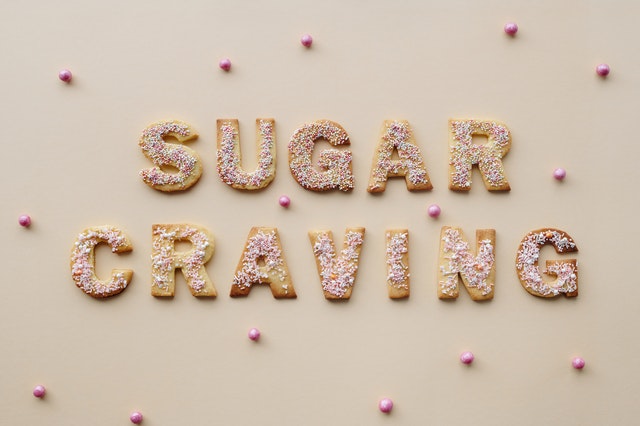
How to deal with it?
Pack something healthy for a mid-afternoon snack at work, or prepare something yummy but not devastating to your blood sugar if you’re at home. Try an apple or banana with nut butter, fresh veggies with a homemade (or healthy store-bought) dip/ dressing, or a scoop of full-fat yogurt with a sprinkle of home – made granola and cinnamon.
We have a saying around our house: “If you’re not hungry for an apple, you’re probably not really hungry.” It doesn’t have to be an apple, but you get the point: If your healthy snack option doesn’t seem so appealing, chances are you’re not actually hungry. Skip the snack and instead take a break from your desk or change up your at-home routine. Do something other than eating to stimulate your brain and body, as it might be the stimulation and not the food that you’re actually craving, after all. Watch that craving disappear like a man from a dirty kitchen after a dinner party.
Food Cravings is Positive
Think of your favorite foods as a reward, a small treat after you’ve finished your exercise for the day, perhaps. “Don’t think of a food craving as a negative,” she says. “For most people, anything is OK in moderation. “Food cravings are every dieter’s nightmare. Even healthy eaters struggle with yearnings for delicious sweet or savory snacks. We all get them and sometimes we give in to them. Sadly, those nagging hunger pangs can easily make or break your weight loss efforts. They tank your confidence and derail your diet plan. So it’s important to know how to handle them.
Why We Get Food Cravings
There is many controversy about exactly why we get cravings. But experts have suggested that the nagging pangs are physiological. Our bodies crave certain nutrients when we want the result that the food might bring. For example, a candy bar provides a sugar rush. Or we might crave comfort foods as a way to increase feeling of comfort. There are also hormones involved in hunger and cravings. Leptin, ghrelin and other hormones in your body can change the way we experience hunger. Fitness and Health experts often tell us that food cravings can occur when our bodies are dehydrated. It’s possible that food cravings are caused by a combination of both physiological and situational factors. It is also possible that different dieters are affected by different causes.
But some of them believe that cravings are simple a function of habit. For example, we might snack on food when we are bored or when we are looking for a way to avoid the work that we have to do.
The Neurobiology of Cravings
The terms “sugar addict” or “chocoholic” are often used, and people may blame cravings on a sweet tooth, bad eating habits, or lack of self-control. These may be true to a degree, but cravings actually involve a complex interplay of factors: brain messages, behaviors that become habits over time, and having easy access to food.
Normally when eating a meal, appetite hormones are released. Examples are glucagon-like peptide and cholecystokinin from the digestive tract, and leptin from fat cells, which cause feelings of fullness and communicate with the brain to stop eating. On the flipside, if the body hasn’t received food for several hours, ghrelin is released from the stomach to signal hunger. Eating hyperpalatable foods too often might interfere with how the brain processes these hormonal signals so that one may feel continued cravings despite having eaten enough food.
Researches
- Studies have shown that foods that stimulate the reward regions of the brain influence our food choices and eating behaviors. When we eat certain foods, the neurons in the reward region become very active, creating highly positive feelings of pleasure so that we want to keep seeking these foods regularly. These foods are sometimes labeled because they are easy to digest and have enjoyable qualities of sweet, saltiness, or richness. Hyperpalatable foods stimulates the release of metabolic, stress, and appetite hormones including insulin, cortisol, dopamine, leptin, and ghrelin, all of which play a role in cravings.
- Studies have also shown that brain signals can become disrupted when eating a very high sugar or high fat diet, which may trigger the release of hormones that reduce stressful emotions and therefore lead to a habitual desire for these “comforting” foods. Interestingly, human studies have also found associations with strong cravings and artificially sweetened foods and beverages (i.e., diet soda), as their intensely sweet flavor may produce the same rewarding effects as sugar.
Factors that Affect Cravings
- Food industry advertising
- Stress
- Sleep
- Exercise
- Hormonal changes
- Medications

One of the most common questions dietitians receive is “How can I stop cravings?” Whether it’s sugar, salty snacks, carbs, fried foods… cravings are human! We all have ’em!
Cravings can also be hormonally-driven. Not only do your cravings increase during PMS (Premenstrual Syndrome), but an imbalance of your hunger and fullness hormones (ghrelin and leptin) or happiness hormones, like serotonin, can also cause food cravings.
A popular myth about cravings is that they’re due to a nutrient deficiency. For example, craving a burger around your period because you lose iron at that time of the month. Actually, the jury is still out on this one and this is more anecdotal than based in science.
Identifying a Craving
The hardest part about a true craving is identifying it. What is it EXACTLY that you are craving?
Identifying your craving is a key part in navigating how to handle food cravings. If you’re not sure what you’re craving… search for it! The last thing we want to do when trying to satisfy a craving is eat around the craving. Instead we want to pinpoint the craving, eat and enjoy that food… without guilt! When you eat around your craving, you’re not only more likely to consume more calories and eat more than your body needs, but feel guilty after honoring your craving.
But what if there was a way to stop cravings in the first place?
I’ll be the first to tell you it’s impossible to stop ALL cravings. It’s just not human behavior. Sure, you can learn to ignore your cravings and deprive yourself of your favorite fun foods, but what good is that? Food is meant to be fun and enjoyed! But there are ways you can minimize your cravings and conquer constant, unwanted cravings.
Tips to Stop Cravings…
Tip #1: Eat well-balanced + satisfying meals
Eating a balance of nutrients at every meal, you will be more satisfied, and actually reduce your cravings and mindless munching throughout the afternoon and evening. A balance of nutrients – carbohydrate, protein, and fat is a satisfying combination. When we’re satisfied from the food we eat, we’re less likely to crave any one food group.
ACTION TIP: Try to include carbohydrates, protein, and fat at every meal
Tip #2: Stay hydrated
Hydration is so important. Hydration influences so many different aspects of your health and well being… including food cravings. Water helps transport nutrients around your body. When you’re under-hydrated, that lack of fluid can make it difficult for organs, like your liver, to release glycogen (stored glucose) and other components from your energy stores. When your body doesn’t have enough glucose, it can trigger food cravings. Even more, under-hydration can increase your hunger, only further boosting your cravings.
ACTION TIP: Aim to drink enough so that you’re urine is pale yellow. For most healthy individuals this will be about 2 – 3 liters per day.

Tip #3: Get 7-9 hours of sleep per night
A lack of sleep can increase your hunger hormones and increase cravings. What a combination! When you’re tired, your body wants quick energy like a sugar spike. Usually you may recognize this as a craving for easy to digest carbohydrates, like bread, desserts, or candy. You can fight these cravings, but if you’re consistently over-tired, eventually your willpower will lose. The only way to remedy this is to consistently sleep enough.
ACTION TIP: Most individuals require about 7-9 hours of sleep each night. Create a bedtime routine to signal to your body that it’s time to wind down.
Tip #4: Give yourself permission to enjoy your favorite fun foods, whenever you want them
Yes, you can have that burger + fries and still feel good! You can include cookies into your regular diet.
The key is HABITUATING to your favorite foods. When we place foods off-limits, we want them more. Think about it – you want what you can’t have! (It’s kind of like dating in your early 20s!) When you give yourself permission and consistently expose yourself to these foods, the novelty wears off. You become habituated to these previously “forbidden foods.” But you may have a journey to get to a place where your previously “forbidden foods” are off of their pedestal. Support and accountability can help to prevent a dieting mentality from creeping back in. I’m here for you!
ACTION TIP: give yourself unregulated permission to enjoy your favorite foods in order for your cravings to dissipate.
Here are some tips:
- Stop referring to foods as “good” or “bad” – food cannot inherently have these qualities.
- When you want a food, give yourself permission to eat it.
- Don’t restrict the amount of food you eat. At first it may take more cookies to feel satisfied. Over time, this will decrease as your body (mentally and physically) knows it can eat this food at any time.
Tip #5: Manage your stress without food
Stress can also spike your food cravings. It’s hormonal. Your stress hormones make you crave comfort foods that are typically high in carbohydrates and fat.
ACTION TIP: Focus on non-food related ways to manage your stress…
- Get adequate sleep
- Try different relaxation techniques
- Meditate
- Do deep breathing exercises
- Laugh more
- Have positive relationships
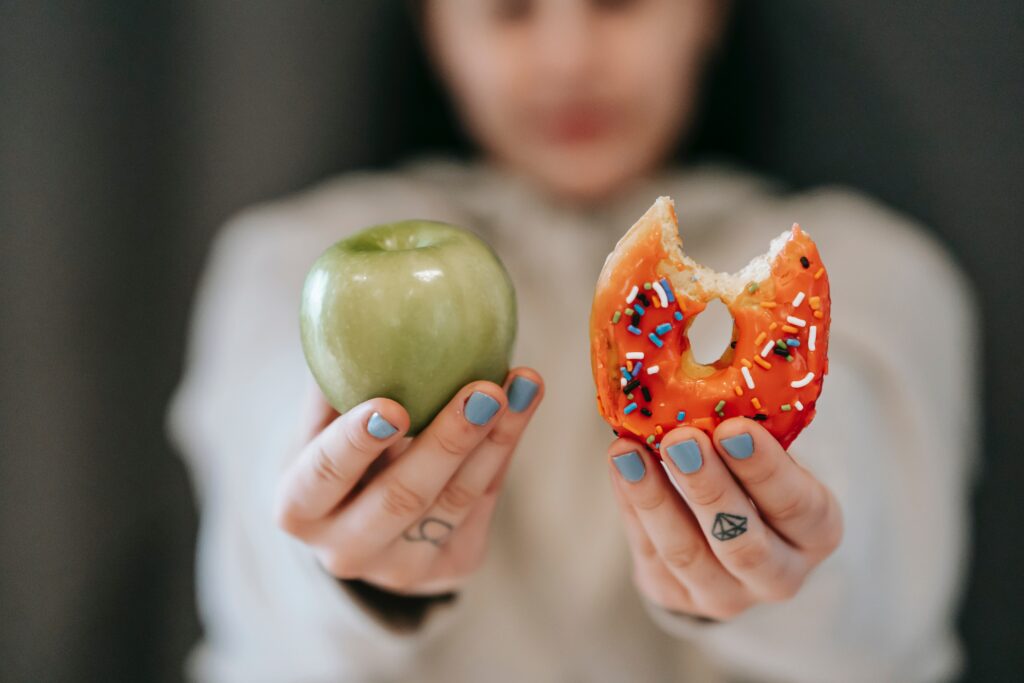
Other tips how you can conquer food Cravings
- Believe that cravings will pass, cravings are not actual hunger.
- Stop labeling foods as bad or forbidden.
- The 5 Ds of food cravings:
- Delay-wait 10 minutes
- Distract– do something else
- Distance– don’t keep the temptation on hand in the kitchen
- Determine– think about how much you actually want it
- Decide– know how much of it to eat, slow down and enjoy it (taste it, don’t waste it)
- Stay active.
- Slow your eating rate.
- Separate eating from other activities. This will remove the ability of other activities to stimulate eating and allows you to respond to the actual feeling of hunger.
- Do nothing else while eating
- Follow an eating schedule; eat at the same time everyday
- Eat in one place, preferably the dinner table and not your couch or desk
- Don’t always feel like you have to clean your plate
Here are some strategies for dealing with the cravings (especially the less healthy ones):
- Eat in Moderation– Many women find it extremely difficult to ignore the craving altogether. Instead, eat what you’re craving, but if it’s high-calorie or high-fat, enjoy it in moderation.
- Find a Healthy Substitute – Is part of the pregnancy craving the urge to devour eight times the normal serving size? That may be fine if you’re craving healthy fruits and veggies, but if the food you’re craving are highly caloric or otherwise unhealthy, finding an alternative to scratch your itch might be your best bet!
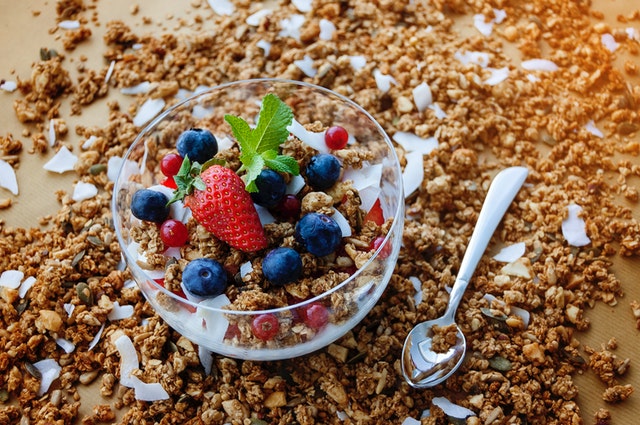
-
- Craving a milkshake? While there’s nothing inherently wrong with dairy products, there are less caloric ways to fulfill this craving. These days, Greek frozen yogurt, oat milk ice cream, and a variety of other low-fat and low-sugar options can deliver that creamy goodness without unhealthy weight gain from excessive fat and sugar.
- Craving chocolate? Substitute milk chocolate for dark chocolate.
- Craving a salty crunch? While pregnant women do need sufficient sodium, excessive salt intake is associated with heart disease and may even pose some health risk to your baby’s development. If a nightly bowl of popcorn bathed in salt has become a habit, try cumin or a low-sodium salt substitute to keep your sodium intake under 2,400 mg a day.
- Craving something sugary? Whether you’re craving cereal or baked goods, a great alternative is to go for a whole-grain version.
FAQ
Which tips to stop cravings will you try first?
And there you have it… 5 tips to stop cravings in the first place!
But if you are struggling with food cravings, I encourage you to join my Nutrition Training Program where we discuss how to conquer cravings, eat a well-balanced diet, break free from food rules, and more.
Are cravings caused by nutrient deficiencies?
Although some conditions such as sodium deficiency and pica can cause cravings, there is no conclusive evidence that cravings are caused by nutrient deficiencies. Certain known facts about cravings like the influence of sleep and nutrition habits (and perhaps even gender differences) make it more likely that cravings are caused by external factors and not a lack of specific nutrients.

